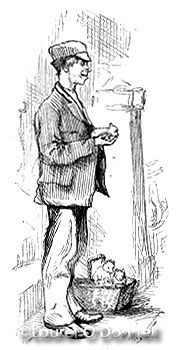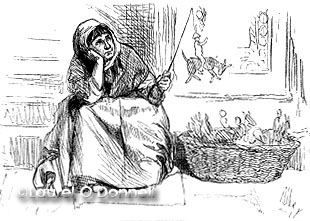|
|
 Left: Spitz Pups.
own haunts. No man with a grain of proper feeling in him can be at ease in Purcell's during the women's shopping hours. It is singularly and unaccountably unpleasant to see a room full of women eating, no matter how dainty the food may be. At Maillard's a mild infusion of the male element makes the sight more endurable, and there we may learn what a stickler for the minor elegancies of life my lady is. The plate, the linen, the crystal-ware, are all flawless. The menu is on satin paper in gold and delicate tints, wrought into suggestions of cherubs and paradise.
A tenet exists in the unwritten constitution of the polite world which prescribes an early hour after which women shall not be seen unescorted on Broadway, but they remain beyond it and until the iron shutters of the dry-goods stores are drawn down, and the commercial men appear on their way home or to their clubs. Approaching darkness is most effectual in driving them home — they can not resist the terrors of that; and when night is come another phase of "life" is uncovered by the glare of the many hotels, billiard halls, saloons, and supper-rooms which are situated between Twenty-third Street and Thirty-fourth Street. The lights are so numerous and bright that we have no difficulty in making out the faces and dresses of the nocturnal promenaders; the doors of all the public resorts are thrown wide open to us, and if we are not disposed to moralize too much, we can enjoy the excitement of the billiards, or the solace of coffee and cigars in a snug little alcove window, which is like the private box of a theatre, and from which the Vanity Fair outside is like a grand performance prepared for our own particular amusement. Carriages go by in which we discover opera and ball dresses; the men on the sidewalk move along saunteringly, nearly every one with a cigar in his mouth, and the crimson tips of the weeds glow in the air like so many setting suns. The entrances to the hotels are filled with loungers and gossips. These are the men who, in their own estimation, make the world — the men who act in it, and talk about it, and take pleasure out of it. The night-birds hover about the scene until the day-laborers begin to appear again, and the lights in some of the places of entertainment are not put out until sunrise. What we have aimed at, and all that we have been able to obtain, in our superficial glance, has been a few of the more salient phases of the street. All the episodes of a walk on Broadway could not possibly be described in the space to which our article is limited. There are the show windows, which make a complete international exposition of industries; and it would be difficult indeed to think of any thing that could not be bought on Broadway. If in some way the rest of the city should be demolished, Broadway could supply time survivors with every necessary and luxury of life, from dinners at Delmonico's to marmoset monkeys, from Cashmere shawls to household furniture à  The Toy-Woman.
|
|
Page 9
Books & articles appearing here are modified adaptations
from a private collection of vintage books & magazines. Reproduction of these pages is prohibited without written permission. © Laurel O'Donnell, 1996-2006.
|
|

